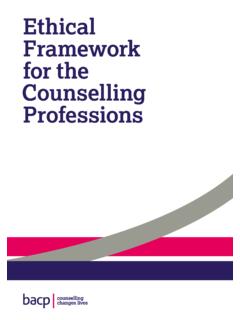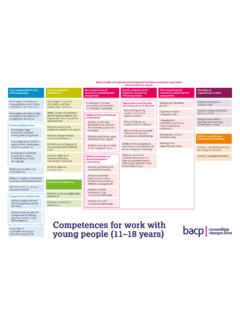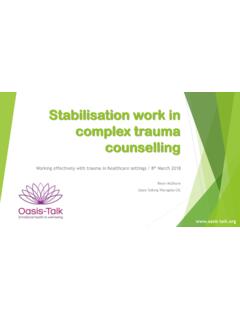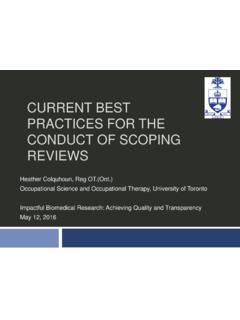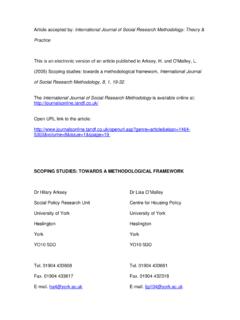Transcription of Contents
1 BACP 2007 The impact of clinical supervision on counsellors and therapists, their practice and their clients: a systematic review of the Summary Page : an introduction research reviews definition of supervision history of supervision of supervision and the role of the research questions through systematic review the review question supervision research of the review tasks One: scoping and retrieval of relevant studies of the review: defining inclusion and exclusion strategy , recording and rating relevance of methodology of each overview of the titles of studies included and excluded overview of titles of included overview of titles of studies unobtainable and impact approaches and measures used in the supervisees, supervisors and clients in the supervisees supervisors clients of the of the evidence and study limitations of methodological problems evidence An overview 17 The evidence 17 A summary of the evidence development29 An overview 29 The evidence 29 A summary of the evidence 31 The impact of clinical supervision on counsellors and therapists.
2 Their practice and their clients: a systematic review of the literature BACP An overview 31 The evidence 31 A summary of the evidence of understanding from supervision to therapy32 An overview 32 The evidence 32 A summary of the evidence outcome34 An overview 34 The evidence 34 A summary of the evidence and implications for research and practice Page ArticlesPage of articles/ studies included in the review of articles/ studies unable to obtain in Phase of relevant supervision research included in the supervision research reviews include in Phase Two but unobtainable excluded during Phase Two from Phase One Screening References Page form 75 List of tables and figures
3 Figure 1:Flowchart of Phase One and Phase Two: an overview of literature search/retrieval, initial screening of studies and data extraction8 Table 1:Exclusion criteria for the screening of articles/studies10 Table 2:A list of the 25 articles/ studies included in this review11 Table 3:The frequency of supervision in initial-impact categories12 Table 4:An overview of supervision impacts for each study13 Table 5:An overview of general methodological approaches to studies14 Table 6:An overview of types of methods used to collect data15 Table 7:Instruments used in the reviewed studies16 Table 8:Research evidence for self-awareness18 Table 9: Research evidence for skill development19 Table 10:Research evidence for self-efficacy22 Table 11: Research evidence for transfer of understanding from supervision to therapy26 Table 12:Research evidence for client outcome28 BACP 2007 The impact of clinical supervision on counsellors and therapists, their practice and their clients: a systematic review of the literature03 Section 1: Executive summaryOverviewThe British Association for Counselling and Psychotherapy (BACP) commissioned a systematic review of the research evidence on the impact of supervision on counsellors and psychotherapists, their practice and their clients.
4 The objectives of this review were to systematically locate, appraise and synthesise evidence from research studies in order to obtain a reliable overview of the impact of clinical supervision. Detailed inclusion and exclusion criteria were agreed. EPPI-Reviewer software was used to organise and manage the analysis of the articles that met the inclusion criteria. This paper reports on the findings of this review, from articles published in this area since 1980, and reviews 25 individual published studies . The quality of evidence is variable, but supervision is consistently demonstrated to have some positive impacts on the supervisee. MethodsThe review identified and summarised the evidence relating to review questions.
5 The inclusion criteria for the review stipulated that the research had to examine some level of impact and not just be about the supervisee s satisfaction with supervision. After searches of electronic databases, hand-searches of relevant books and journals, internet searches and citation tracking, more than 8,000 studies were screened and 33 studies were deemed appropriate for inclusion in the review. Eight studies were unobtainable at the time; therefore 25 are included in the final review. A critical appraisal of each paper by up to three independent reviewers identified the relevant results from each study. The studies included a range of methodological approaches quantitative, qualitative and mixed methods.
6 The results from these studies are presented in summary tables, along with a narrative report of them and consideration of methodological limitations. The findings of impacts of supervisionThe systematic review found: n limited evidence that supervision can enhance the self-efficacy of the supervisee (seven quantitative studies );n limited evidence that supervision has a beneficial effect on the supervisees, the client and the outcome of therapy (one RCT);n limited evidence that supervision that focuses on the working alliance can influence client perception of this and enhance treatment outcome in the brief psychotherapeutic treatment of depression (one RCT); n limited evidence that clients treated by supervised therapists are more satisfied than those treated by unsupervised therapists (one RCT).
7 N limited evidence that both skill and process supervision have the same positive impact on client outcome (one RCT);n limited evidence that counselling and psychotherapeutic skills develop through supervision (seven quantitative studies , one mixed-method study, two qualitative studies );n preliminary evidence that supervisee self-awareness increases as a result of counselling and psychotherapy training, and that some of that development may be attributed to supervision (one qualitative study, one cross-sectional survey and one longitudinal study); n tentative evidence to support the assertion that learning in supervision is transferred to practice (one quantitative study, three mixed-method studies and one single case qualitative study);n tentative evidence that there is thematic transfer of an appropriate kind from supervision to therapy (one single case qualitative study);n tentative evidence to suggest that trustworthiness of the supervisor is an important factor in effective supervision (one quantitative study); n tentative evidence to suggest that supervisees perceived individual supervision as safer than group supervision in promoting their personal growth (one qualitative study).
8 N tentative evidence to suggest that the timing of supervision can influence what is dealt with (one mixed method study).The findings of methodological issuesThe systematic review found that:n most of the evidence is related to the impact of supervision for trainees there is a clear need to examine the impact of supervision on qualified and experienced practitioners; n most of the evidence is about the impact of supervision on the supervisee there is a clear need for more research about the impact of supervision on client outcome;n there is a need to examine the longer term impact of supervision with more robust longitudinal studies ;n many studies reviewed have a range of methodological weaknesses there is a need for the development of robust methodology for supervision research.
9 N there is very little research on supervision in the UK, thus a strategic UK supervision research agenda is urgently impact of clinical supervision on counsellors and therapists, their practice and their clients: a systematic review of the literature BACP 200704 Section 2: Supervision: an introductionSupervision of counselling and psychotherapy practice is widely promoted as an essential aspect of ethical and effective therapy, and is seen as the cornerstone of continuing professional development. The Ethical Framework for Good Practice of Counselling and Psychotherapy (BACP, 2002) stresses the importance of supervision in supporting the practitioner to adhere to the ethical framework and in being a crucial aspect of the infrastructure that underpins professional practice.
10 In the UK, the British Association for Counselling and Psychotherapy (BACP) requires all accredited therapists to have supervision throughout their career, and other organisations representing counsellors and psychotherapists strongly recommend supervision. Requirements for the supervision of therapists vary in different countries; in the USA, where most research into supervision is conducted, it is only trainees who routinely participate in supervision. A previous scoping search of supervision (Wheeler, 2003: see pg 6 for a brief overview) found that out of 388 studies , only 11 had been conducted in Britain and only six related to experienced practitioners, highlighting the way in which supervision research is skewed towards work abroad and to work with trainees.


